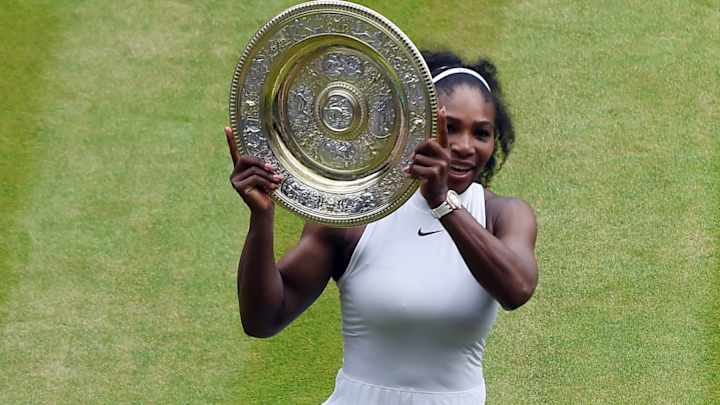Murray's competitiveness helped him win 2nd Wimbledon title

LONDON (AP) There are many reasons for Andy Murray's second Wimbledon championship and third Grand Slam title, not least of which would be his ability to return Milos Raonic's big serves in the final.
There was also Murray's unrelenting court coverage.
Those dipping passing shots when Raonic charged the net.
Those clean strokes from every angle, limiting his unforced errors to merely a dozen during the 6-4, 7-6 (3), 7-6 (2) victory Sunday that allowed Murray to end his three-match losing streak in major finals in rather dominating fashion.
And, a cynic might point out, the chance to finally face someone other than Novak Djokovic or Roger Federer with a Grand Slam title at stake.
Murray's mother, former British Fed Cup captain Judy, pointed to another, possibly less-apparent, explanation for her son's success.
''He's very good at finding a way to win when he's not playing his best tennis. And he reads the game well,'' she said during a break from the champagne celebration after sitting at Centre Court for the final. ''And he's very competitive.''
That last part dates back years and years.
''Because he's a perfectionist, and he always wanted to win, he was very temperamental as a young player. Very temperamental,'' Mom said, noting that Andy's time at a tennis academy in Spain as a teenager helped curb that somewhat.
''It's part of who he is, and you wouldn't want to change it,'' she added. ''You just have to learn to temper it.''
Here is what else we learned at Wimbledon:
SERENA'S IN A GROOVE: Not that she ever went away, but Serena Williams had what for her amounted to something of a resurgence by collecting her record-tying 22nd Grand Slam title, including seven at Wimbledon. Her serve was superb, and every other part of her game was rather excellent, too. After losses in the semifinals of last year's U.S. Open, then finals of this year's Australian Open and French Open, she once again finished a fortnight holding the trophy.
DJOKOVIC NOT INFALLIBLE: So much for the popular notion that Djokovic was unbeatable. Owner of a 30-match winning streak at majors, including four consecutive titles, he looked out of sorts for much of his third-round loss to Sam Querrey, an American who began Wimbledon ranked 41st and never had made it past the fourth round at a major. How will Djokovic rebound?
FEDERER'S STATUS: Since 2012, when Federer won his 17th Grand Slam title, folks have been guessing when he'll no longer be considered a contender at the majors. They've had to keep waiting for an answer, especially when he was the runner-up at Wimbledon in 2014, and Wimbledon and the U.S. Open in 2015. He'll turn 35 on Aug. 8, and while he did pull off a monumental comeback against Marin Cilic in the quarterfinals, he looked quite vulnerable while losing to Raonic and we still don't know how badly he might have been injured during a fifth-set fall.
WHITHER THE YOUNGSTERS?: Of the eight men's and women's singles semifinalists at Wimbledon, the 25-year-old Raonic was by far the youngest. When, if ever, will the next generation really be here to stay? The members of the women's final four, including a renaissance from 36-year-old Venus Williams, averaged 31 years, 9 months - the oldest at any Grand Slam tournament in the Open era, which began nearly a half-century ago.
U.S. MEN MATTERED: For the first time in a while, American men mattered at Grand Slam time. Four made it to the third round, and two got to the second week. Querrey, a 28-year-old Californian with a big serve, not only defeated Djokovic, but also appeared in his first major quarterfinal. No man from the United States had reached the quarters at any Grand Slam since the 2011 U.S. Open.
---
Follow Howard Fendrich on Twitter at http://twitter.com/HowardFendrich
